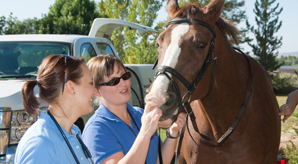

In some equine cases though, a mother's milk can be toxic and lead to severe illness and, if untreated, even death. Hannibal, a newborn foal, was spared this fate because veterinarians at the Colorado State University Equine Reproduction Laboratory used a simple test to find out if he was at risk.
Neonatal isoerythrolysis (NI), also known as jaundice foal syndrome, is a rare disease that may occur in a foal if the mother has antibodies against the red blood cell type of the newborn foal. Foals are normal at birth and are only affected if they ingest colostrum with anti-RBC antibodies directed against their own red blood cells. If the foal has the same blood type as its mother, there is not a problem. NI occurs if the foal inherits the blood type of its father and if the mare's antibodies are directed against that specific blood type. These antibodies are sequestered into colostrum, the first "mother's milk" the foal will suckle. Exposure to these antibodies puts susceptible foals at risk.
"A blood sample from Hannibal's mom showed a strong positive reaction for antibodies against Aa blood group antigens," said Dr. Patrick McCue, who is an equine reproduction specialist at the Veterinary Teaching Hospital and Equine Reproduction Laboratory. "The immune system of the mare must have been exposed to 'foreign' red blood cell antigens by leakage across the placenta during a previous pregnancy or foaling."
During the first 24 hours of life, the gut of a foal absorbs antibodies from the mare's colostrum after nursing. Ingestion of colostrum is critical for the health of the foal as foals are not born with antibodies in their blood that will protect them from various infectious disease organisms they will encounter after they are born. Foals and other large animal newborns are dependent on antibodies from their mother that they obtain through colostrum; a process called "passive transfer of immunity." However, if a foal ingests colostrum containing antibodies against its blood type its red blood cells can be damaged or destroyed, leading to anemia.
"In Hannibal's case, we collected a blood sample from him immediately after birth and performed a Jaundice Foal Agglutination Test using his blood and colostrum from the mare," said Dr. McCue. "The test indicated a positive reaction; therefore, the foal could not safely ingest colostrum from his own mother."
NI-affected foals usually begin to show clinical signs, such as jaundice, weakness, increased respiratory rate, and passage of red-colored urine within 24 to 72 hours after taking in 'toxic' colostrum. Severely affected foals may die if untreated.
Hannibal was allowed to stay in the same stall as his mother, to help promote maternal bonding, but for 24 hours had to wear a foal-size leather muzzle (hence his name) to prevent him from suckling. His mother's colostrum was hand-milked and discarded every hour. Meanwhile, Hannibal received colostrum that had been harvested from another mare that was known to be free of the anti-RBC antibodies.
The alternative colostrum provided the immune protection he would need to survive until his own immune system produced antibodies. He also was bottle fed a commercial mare milk replacer until he was allowed to nurse from his mother.
"After 24 hours, the mare did not have any more colostrum and Hannibal was no longer at any risk," said Dr. McCue. "Fortunately, the mare's maternal instincts were strong and Hannibal eagerly suckled once his muzzle was removed. A healthy Hannibal and his mom went home five days after foaling."
For horse owners, said Dr. McCue, the take-home message is that neonatal isoerythrolysis is a life-threatening condition of newborn foals. NI can be prevented by a pre-foaling screening of the mare's blood and, when a potential problem is detected, screening of the foal to determine if its mother's first milk – exquisitely designed to protect the foal from infectious disease – is a lifesaver or threat to its health.